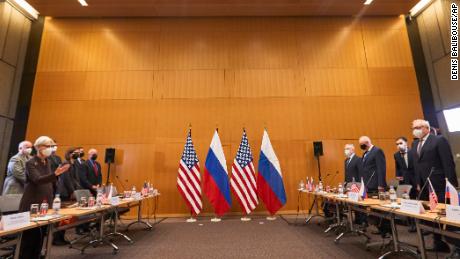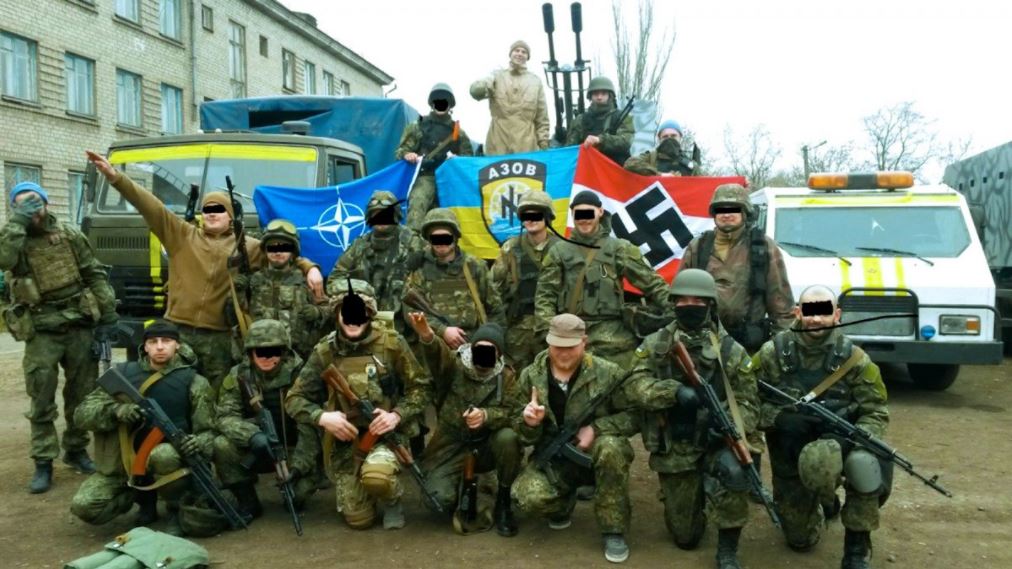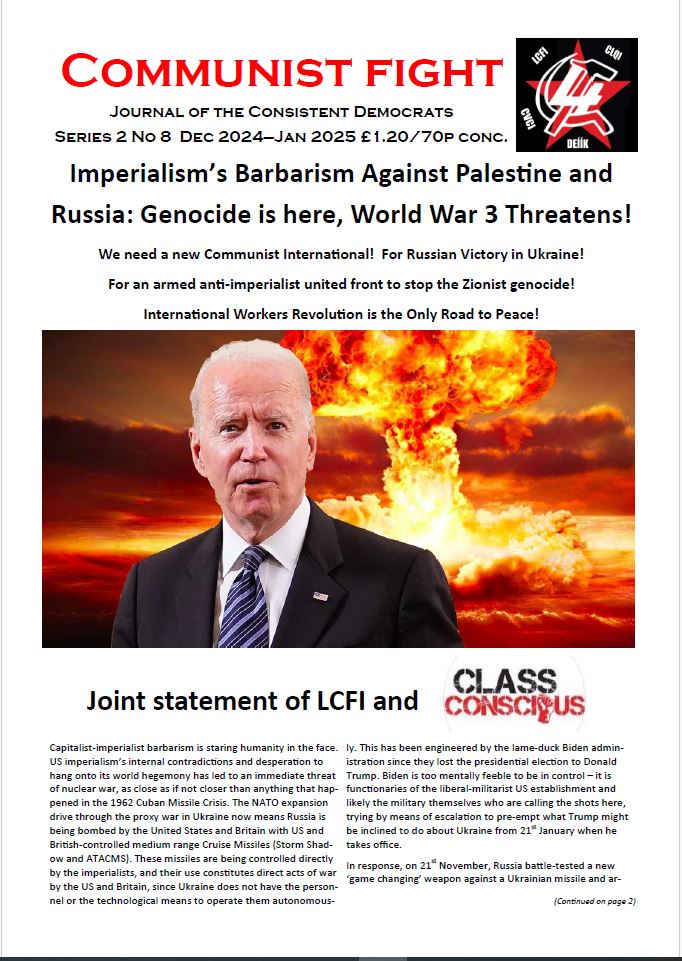
The current confrontation over Ukraine is the consequence of the fundamental drive of United States imperialism, as the world imperialist hegemon, to reconquer the two main countries in the world where capitalism was overthrown during the 20th Century, Russia and China, for capitalism.
That might sound odd considering that everyone knows that ‘Communism’ was overthrown in Russia in August 1991, and that China now, though the ruling party still calls itself the Communist Party, nevertheless has considerable power in capitalist terms, and has been powerful enough economically both to provide the United States with financial relief during the Credit Crunch/Financial Crisis of 2007-9, and to initiate infrastructure projects such as the One Belt, One Road initiative that have challenged the power of US imperialism in Eurasia and even as far away as Africa and Latin America.
The types of capitalism that have been restored in both Russia and China are not ‘pure’. They are hybrid forms that are still considerably marked by the decades of their existence, in Russia’s case three quarters of a century, in which capitalism had been torn out by the roots. Economically, they are still marked by considerable elements of state planning, which coexist with the capitalist market in ways that sometimes partially negate it. They are not imperialist powers in the sense of the United States or countries like Britain, France, Germany and various smaller West European powers, as well as Japan, whose wealth and preponderance in the world is particularly based on the extraction of surplus value from ex-colonial countries. In the case of both Russia and China, their economic strength derives from their own productive capacity, which was developed without capitalism.
Although these regimes, after the counterrevolution, no longer defend the expropriation of capital in a proletarian class sense, their hybrid mixture of statification and capitalism still preserves one remaining gain from the period of the bureaucratically degenerated/deformed proletarian dictatorships: the capacity to act in a systematic way independently of imperialism. Such national independence as a consequence of the expropriation of capital is classically associated with Trotsky’s programme of permanent revolution, though elements of it were achieved even when the agency of expropriation was not the conscious proletariat but a bureaucratically-led peasant movement, such as in China. This deviation from the norm allows these new non-imperialist capitalist powers to provide an alternative pole that semi-colonial nations in conflict with imperialism, such as Iran, or Venezuela, or the two remaining deformed workers states of Cuba and North Korea, can lean on and ally with. This is what the imperialist project of regime change and renewed war drive aims to destroy.
In Russia after 1991, the imperialists thought they had the ideal regime in place, the de facto Western agent Boris Yelstin, who implemented a neoliberal shock treatment that caused huge unemployment, suffering and hardship for the working class, and thus a massive fall in life expectancy. In 1987 Russian life expectancy was 70 years: by 1994 it had fallen to 64 with the steepest fall, of five years decline, happening in the most severe years of Yelstin’s neoliberal shock, from 1991-94. This brutal economic and political decline over several years produced a backlash both at the base of society and at the top, and at the end of the 1990s led to Yelstin being pushed out and, under Putin, the beginnings of a more nationalist policy which in fact was a retreat from subordination to neoliberalism. Among other telling indices, the decline in life expectancy was reversed under Putin, though recently in the Covid pandemic there has been another lesser decline, though this time the cause is obvious.
Resistance to Imperialist Neoliberalism
Since 2009 Putin has put up serious resistance to imperialist aggression beginning with the attempt by the US to bring Georgia into NATO, which he effectively stymied, and continuing most markedly by the progressive and justified intervention of Russian forces into Syria, which thwarted the efforts of US imperialism to use jihadist proxies, backed most notoriously by Saudi Arabia, by Qatar, and to a degree Turkey, with more discreet support from Israel, to deliver another imperialist ‘colour revolution’ against Assad. The imperialist double-dealing over this has been considerable, since the US was both claiming loudly that it was at war with Islamic State and the various more amenable Al Qaeda affiliates active in Syria, while at the same time depending on such forces to destabilise Assad. But this resistance to imperialism has dovetailed very well with China’s own attempts to counter the increasingly strident imperialist campaign against it, the so-called ‘pivot to Asia’, and their bloc against imperialism is itself useful for the masses in much of the world targeted by the imperialists. NATO now has a counterpart in the Pacific, AUKUS, which draws on the residue of the British Empire to threaten China the way NATO has always threatened the USSR and today’s Russia.
So, the project in Ukraine is expand the frontiers of NATO, whose whole purpose is to threaten first the USSR and now Russia, to include Ukraine, which will inevitably mean the placement of deadly US weaponry right on Russia’s border to the West, a severe escalation in the US project of encircling both China and Russia/USSR. NATO, and now AUKUS, in their overall purpose, are successors to the pre-WWII Anti-Comintern Pact, which was formed in 1936 by Nazi Germany and Imperial Japan, later including fascist Italy, to oppose the Communist International in the name of combatting ‘Communism’. It should be realized that even at that time, the Communist International was no longer Communist except in name, it had already abandoned the goals of internationalism and revolution. Today, the remnants of the bureaucratic regimes in Russia and China have, in slightly different ways, abandoned maintaining even the measures of socialisation that Stalin and later Mao maintained. But that is still not enough for the imperialists and the latter-day Anti-Comintern Pacts, they want regime change and what amounts to colonial adminstrations in both Russia and China. And they have initiated a new Cold War to try to nail that down.
Russia justifiably complains that this has broken even the letter of treaties and undertakings given at the end of the previous Cold War, which was supposed to have ended in 1989-90 as part of German reunification, through the Organisation for Security and Co-Operation in Europe (OCSE). But US imperialism, and its European lackeys, including the dying Johnson regime in Britain, regard such things as purely instrumental. And this has been a bipartisan US policy for decades; apart from Biden’s current activities, recall that the Intermediate Nuclear Forces (INF) treaty signed by Ronald Reagan and Mikhail Gorbachev in 1987, was torn up by Trump in 2018.
Thus, the expansion of NATO into Eastern Europe, then the Baltic States and Ukraine, should be viewed as extensions of the attacks of the Anti-Comintern Pact on the workers states and Communist forces, in that period, centrally Hitler’s Operation Barbarossa attack on the USSR in 1941, and the war which Japanese imperialism waged against the Chinese Communists in the same period. Although inter-imperialist rivalries kept the US, Britain, and France out of that particular bloc at that time, nevertheless in class terms the current NATO expansion, and also the creation of AUKUS, are a continuation of Barbarossa, aimed at subjugating the main countries where capitalism was previously overthrown, and wiping out all trace of those revolutions even in an indirect sense. It is thus entirely appropriate that a prominent role in the Ukrainian US puppet regime is played by open Nazis, supporters of the WWII Ukrainian collaborator Stepan Bandera, including the Azov Battalion, whose symbols include the NATO flag and swastika.

Elements of Correct Analysis
A useful assessment of the course of Putin in pulling back from the servility to imperialism of the Yelstin regime is laid out in the Weekly Worker (27 Jan) in an article by Paul Demarty:
“After the eastern European satellite states gave up their ‘socialist’ regimes, Mikhail Gorbachev cut a deal with the west – Germany would be allowed to reunite, on the condition that Nato expansion would go no further east than Germany. Once the Soviet Union dissolved itself, the US considered that agreement null and void – after all, it had been with the USSR, which no longer existed. The rump Russian state was stung by the rapid accession of Poland and the Baltic states to the Nato alliance. The sense of humiliation attached to that phenomenon is not incidental to the rise of Putin and his resurgent nationalism. Russia began, again, to cleave apart from the US-led order, though this took time to fully work itself out.
“A crucial flashpoint came in 2008, when the possibility of Ukrainian and Georgian membership of Nato was first taken seriously by the US. Buoyed by this prospect, Georgian president Mikheil Saakashvili found a pretext to retake two border areas, South Ossetia and Abkhazia, which had, since the USSR’s break-up, been under the de facto control of pro-Russian separatists. The Russians took a dim view of that development and beat the hell out of the Georgians in a brief war. The result was effectively the status quo ante – except now Russia recognised South Ossetia and Abkhazia as independent states. Whether they cared to admit it or not, both Nato and the Georgians knew that, under such conditions, Nato membership was impossible for Georgia; so long as these formally-Georgian territories are under dispute, such a move would immediately invoke mutual defence obligations and demand a global war against Russia. Nobody had an appetite for that, though Saakashvili seems genuinely to have believed that the Americans would come to his rescue.
“The South Ossetian war served notice that the Russian state was prepared to go to war to prevent its encirclement by Nato, which was received with alarm among the pro-western elements in Ukrainian ruling circles, who coexisted uneasily with pro-Russian opponents. In the course of the Soviet era, the eastern part of Ukraine had been extensively industrialised and had an influx of Russian workers to meet demand. Post-Soviet deindustrialisation hit these areas hard. In parts of the west, meanwhile, Ukrainian national sentiment was triumphant, and resented the cautiousness of the country’s elite towards its eastern neighbours. Such was the background to the political crisis of 2014, when president Victor Yanukovych’s stymying of closer relations with the European Union inadvertently set off a colour revolution that placed, ultimately, an alliance of ‘moderate’ and far-right nationalists in charge.”
https://www.weeklyworker.co.uk/worker/1380/on-the-brink-of-war/
The point about Georgia is crucial. At least one ostensibly Trotskyist group, the New Zealand-centred International Bolshevik Tendency, concluded from Putin’s 2009 successful resistance to a NATO takeover of Georgia that Russia had become ‘imperialist’. Which is a strange conclusion from what is obviously a defensive move, as even comrade Demarty, spokesperson for an organisation that has often positively embraced the notion of the ‘third camp’ characterised thus:
“Russia’s actions in both these theatres are of the same type. They combine offensive tactics – annexing the Crimea, aggressively retaking South Ossetia and Abkhazia – with a defensive strategy. The latter part of the equation is the one that gets lost. Russia is, militarily at least, a capital-G, capital-P Great Power. It takes an interest in its near abroad, and this interest is characterised by resisting attempts to break these countries from its sphere of influence. It’s not completely clear that Russia could militarily conquer Ukraine from one end to the other (though you’d bet on them to do more damage than the Ukrainians), but it could certainly have conquered Georgia, and it didn’t. So far as Ukraine goes, Russia has shown no interest at all in any part of it other than the majority-Russian eastern provinces and the Crimea, which has a vitally important Russian naval base and was part of Ukraine only as a result of a Khrushchev-era lines-on-a-map exercise.”
This is hardly the conduct of a power engaged in imperialist rivalry to the US in seeking to conquer colonies and markets. It actually reflects the strategy of a non-imperialist capitalism in seeking to resist and safeguard itself from being subjugated in the manner of many if not most countries in the semi-colonial world. Unlike the imperialist countries, Russia’s wealth overwhelmingly comes from its own productive capacity, and not the systematic transfer of surplus value from semi-colonies. Indeed, its antagonism to NATO comes from its resistance to being forced into the position of a semi-colony; the objective of NATO and its AUKUS spinoff is precisely to subordinate Russia and China and thus finally complete the counterrevolution.
Paul Demarty’s article correctly criticises the Socialist Workers Party for making “false equivalences … when it characterises the whole issue as one of ‘sabre-rattling between US and Russian imperialism’” and observes that “The SWP seems to be reverting to its old ‘neither Washington nor Moscow’ line” but then endorses that line despite conceding that “The characterisation of both as ‘imperialist’ has at least the sense that both operate with a ruthless attitude to the questions contested between them; but it wholly obliterates the weakness of Russia’s position.” Thus despite the correct analysis in Demarty’s article, he then concludes merely that:
“The SWP at least concludes, correctly, that ‘in Britain socialists should build opposition to the US and British states beating the drums of war’. Indeed, that is our first and only duty, especially given our own state’s foul role in furthering the drive to a conflict that could – with a snake-eyes roll of the dice – wipe out human civilisation.”
Which winds up as a kind of pacifist position, which puts the kind of passive opposition – refusing to publicly take sides – that characterises much ‘far left’ anti-war activism, refusing to push the questions of principle as to why the working class should take sides on matters like this, why it should publicly stand up and defend Russia and China. Thus, for all its promising analysis, Demarty’s article is in the end disappointing, as it evades posing the need for a political fight against the spontaneous and wrong-headed third-campism that is only too common on the left regarding this question.
We will not so evade: we seek to elevate the question of principle to the fore, and to turn spontaneity into consciousness, to paraphrase Lenin, by publicly putting the programmatic case why the labour movement should take sides with Russia and China against US-led NATO/AUKUS imperialism.

